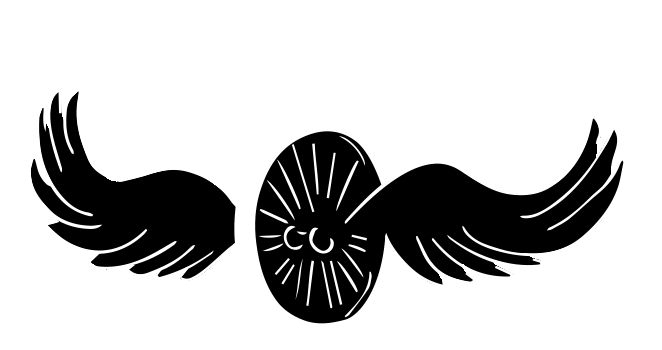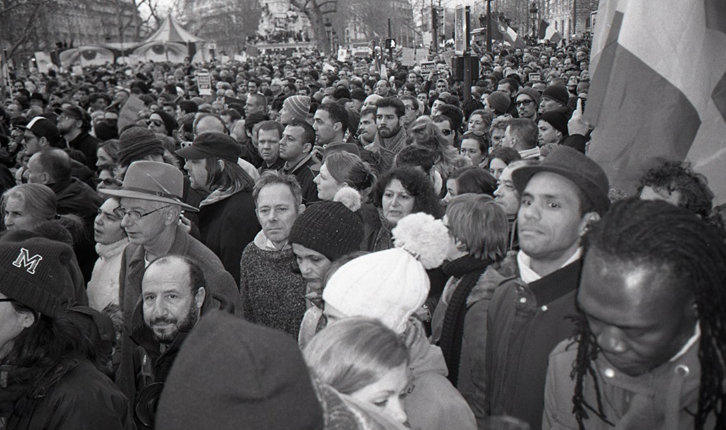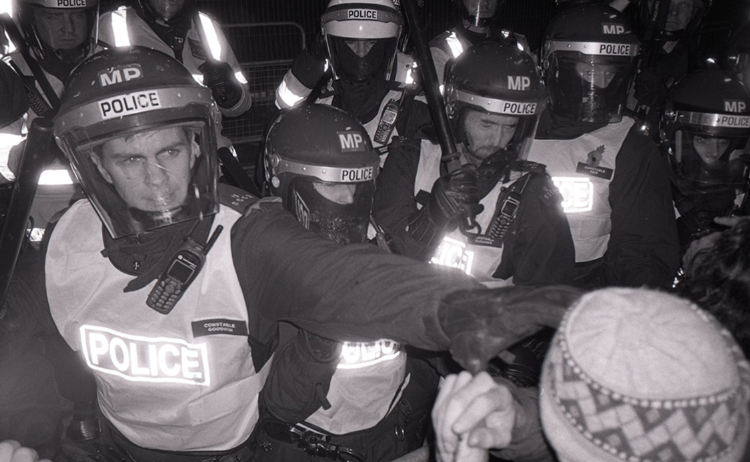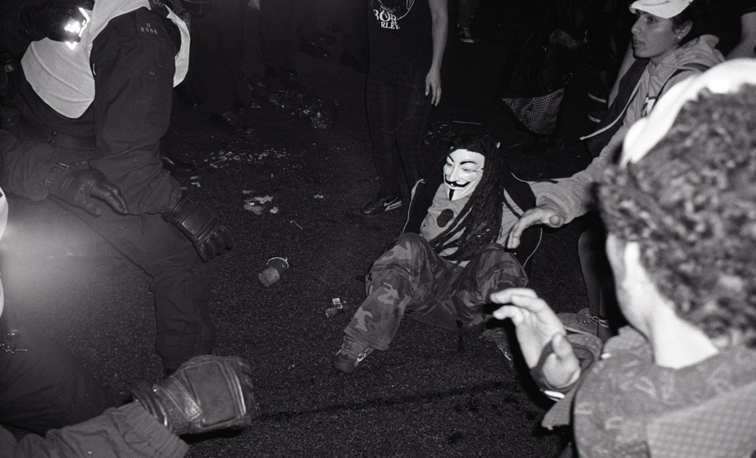
"DEFIANCE" Paper Collage, 2014, Ben Palmer
FUTILITY:

FUTILITY presents a reportage on the recurrent opposition to political and religious allegiance; Both of which distract from greater issues and impede positive unified solution to them. With these photos I also attempt to interpret some of my society's most dangerous flaws; Apathy, misguided rage & pride, lack of civil responsibility and the perpetuation of stereotypes. Ultimately, the apparent futility of not just violent public protest but of violence itself as a means of communication and social leverage. One of the few attributes I’m not ashamed to pride myself on is being an adequately compassionate and intuitive member of mankind. Nonetheless with such an overwhelming plethora of global and social concerns, let alone the abundance of professionals to already document them- It seems only reasonable at present, with due respect to speak for myself; On a situation I have witnessed, can reasonably claim to comprehend and of which the issues involved continue to affect me on a sociological level.
This photo was taken at the Million Mask March, London on 5.11.14 with a Canon A-1 camera and Kodak Tri-X film. Before going into more detail I’ll take this opportunity to emphasise that my choice of camera-film combination, however predictable, were a simple matter of circumstance. Despite my preferences, any presumptions towards nostalgia may be duly adjourned by the relevant facts. Being of which that I was present and, of my own inclination, captured the event as it unfolded. With no protection from, or allegiance to, either party involved. I hope the nature of my delivery doesn’t distract from its content.

The March was instigated by the Anonymous Movement who describe themselves as follows: “A truth movement advocating hacktivism as self-defence for unconstitutional government. It is our aim to shed light on corrupt government in order to set people free from oppression. Since Anonymous is a movement and not an organization, our leadership is undefined and fluid. We function not by credentials but by the power of idea to resonate with the whole. With no rulers, there are no rules and no specific membership criteria.” (Anon, Millionmaskmarch.com) An admirable yet conceptually flawed manifesto.
In Chicago on 6.10.69 The Weather Underground took a similar approach to Democracy by bombing Haymarket police station after issuing ‘fair warning’ to evacuate its civilians. Their aspiring student uprising bowed under the strain of membership influx, conflicting ideals and the subsequent disillusionment following arrests and accidental detonation of their arsenal. Finding individuals willing to give their lives to a cause is not difficult. The problem is finding that balance of gesticulation which doesn’t result in wounding on all sides or final resignation after lack of progress.

When I took this photo [above] the barrier immediately appeared to symbolise this recurrent futility. An un-malleable object pushing back and forth between the self-appointed ‘people’ and ‘representatives of power.’ Both so vehement in the compounding of their power that alternate solution seems unfathomable. The concentration of fear, fury and disorientation in this stalemate meant that simply calling a truce or turning back was not an option.
In his highly esteemed lecture Desire, Alan Watts observed “The only thing we learn from history is that we don’t learn from history!” Martyrdom, it seems, is not the answer. Yet a sufficient and realistic solution to society’s prevalent misgivings is nigh on impossible to define.
Whilst present I saw protesters throw fireworks into their own ranks, a girl struck across the face with a baton, people beaten on the ground for not dispersing and an unwitting commuter stood fast in shock amongst the violence. What was hardest to comprehend though, and to my knowledge has not been mentioned elsewhere, was that the police were posted to protect the square. An unremarkable area except for its statues of Mandela (which surely wouldn’t be targeted?) and Churchill (who’s head is supposedly electrified to deter pigeons.) In any event what could result but removable graffiti and short-lived occupation. A stone’s throw behind the flash point lies Parliament itself, to which no attack was directed. The police and protesters were penned and pitted against one another and engaged.

One might be forgiven for displaying moderate anger towards authority. More so in a place afforded such luxuries as satire, the right to vote and emancipation from sanctioned religious persecution; A society where subversion doesn’t lead to immediate punishment. Am I suggesting we’re spoilt in England? Not necessarily. Do I think protests are a waste of energy? No. What I do think is that protests in London are stigmatised. Partly by sparse groups of disaffected people insisting on validation, the only way they know how or choose to implement. Projecting one’s inadequacies evidently passes for acceptable and predominantly admirable. Whilst this is no more than irreverent within popular culture, on the ground and in effect where physical wellbeing and liberty are at stake, this volatile psyche is to be treated as wildly beyond reason as fire. Not to be stamped out but prevented by means of removing the combination of fuel and ignition. To stop a fire we must choose between being responsible for its power or by burning everything in its path to prevent it spreading.
It’s all too easy for the outraged and fearful to dismiss notions of consideration for their own actions as idealistic. I appeal that resorting to violence as a means of change, just as with apathy, is detrimental to our existence. Many banners at the march screamed for Revolution. Which in London is a fantasy. Nothing worth changing could ever be so straightforward. The foundation for a satisfactory world begins with ourselves. Long before the emergence of youth revolt movements Charles the 2nd told John Wilmot, his nihilistic right-hand man “Anyone can oppose, it’s fun to be against things, but there comes a time when you have to start being for things as well.”
Perpetuating stereotypes for further oppression will dig holes that further generations, despite their level of camaraderie, won’t be able to climb out of. I don’t trust the police, so I avoid them! Your average troublemaker is hard to convince that they can work their way out of despair. They can take what they want from life and bear the consequences. Better yet, in a reasonable manner, they could take all they deserve until they are too old or content to take anymore. Away from sirens, rivals, consumerist competition and any other avoidable traps of the infinitely futile pseudo-sociopathic binary ethos. In a form that doesn’t give the law justification to, ultimately, revoke their ability to escape the system they blame for their perturbation.
In his 2007 lecture 'Uncut in Israel' activist Henry Rollins appealed “Real substantive change comes from private citizens going "Not on my watch." He then goes on to urge "If you really love your country and humanity, find that ember, that jewel of rage and use it for civic good.”
Words: Ben Palmer
Photography: Ben Palmer


















